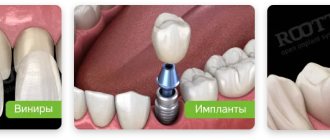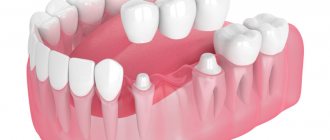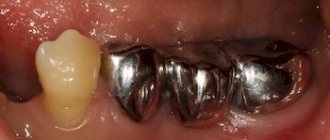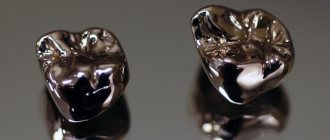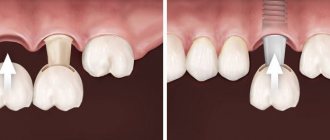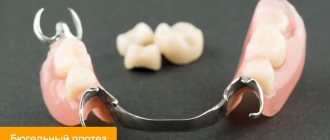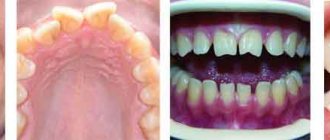Choice according to indications and budget
The best dentures are those that are indicated for the patient. Generally speaking, the most modern designs will be those based on implants. However, there are two very important points here: implantation has a number of limitations and is considered an expensive procedure (especially if we are talking about complete dental restoration). In this case, other structures come to the rescue, which are also designed to restore chewing function and aesthetics. Before we start talking about the different systems in more detail, we need to make some distinctions so that you don't get confused.
All dentures are usually divided into several types. First of all, the number of teeth being replaced is taken into account: this criterion implies the installation of a partial or complete denture. According to the method of fixation of the structure in the oral cavity, removable, conditionally removable and fixed dentures are distinguished. Which ones are better - read on.
What to choose for tooth replacement – ceramic or plastic prosthesis?
The choice between these materials is determined by the clinical picture. If we are talking about the need to urgently “close” a defect between the teeth while preparations for implantation are underway, there is no point in overpaying for ceramics. A plastic prosthesis copes well with this task. Its resource lasts for 3-4 months. As a rule, this time is enough to prepare the patient’s oral cavity for implantation or eliminate contraindications to fixed prosthetics. If you need to solve the problem for a long time, and there are not enough teeth in the frontal area, a ceramic prosthesis is a popular and reasonable choice.
If you still have questions about choosing materials for dental prosthetics in a particular case, sign up for a consultation with experienced orthopedists at Amazing Price Dentistry. Call by phone.
Author:
Mayorov Andrey Mikhailovich
Specialization:
orthopedic dentistry, dental prosthetics, implant installation
Which denture is best for missing teeth?
Previously, patients who, for one reason or another, were unable to have implants installed, had to put up with rather uncomfortable prostheses made of hard plastic. Today there are modern designs on the market that cause virtually no inconvenience to their owner. Many are also looking for the best removable dentures for the upper jaw, since it is when restoring teeth in the upper jaw that good fixation of the structure is especially important so that the denture does not fall out in the most unexpected cases. Installation of a high-quality fixed (conditionally removable) complete denture is not complete without implantation.
Bridge prosthesis on implants
When several teeth are missing in a row, implant-supported dentures are the ideal choice. As a rule, 2 implants are installed, onto which a prosthesis imitating the crown part of the tooth is subsequently fixed.
Classic bridges
Fixed structures that replace a fragment of the dentition and are installed on adjacent ground teeth. The most modern bridges are usually made of ceramic and look more aesthetically pleasing than their metal counterparts.
Butterfly prosthesis
So named because of its shape, which resembles the wings of insects. Allows you to replace up to three missing teeth in a row. A plastic butterfly prosthesis imitates the crown of a tooth and part of the gum, attached to adjacent teeth using clasps. Application is justified as a temporary measure.
Clasp dentures
The best dentures of this type are considered to be structures made of nylon and acrylic, imitating part of the dentition on both sides of the jaw. There are designs with metal arches and with metal fixing elements (clasps), the disadvantages of which are allergic reactions, injury to one’s own supporting teeth and aesthetics.
Complete denture on implants with bar fixation
It is considered one of the best options for a complete denture on implants, since the load is distributed evenly across the entire beam and high stability of the entire structure is achieved.
Complete denture on implants with ball-shaped fixation
A spherical abutment is installed on each implant, which is fixed to the prosthesis using special locks. It is also considered an excellent option, but is slightly inferior to beam structures in terms of reliability.
Removable denture on mini-implants
Mini-implants are also installed into the bone, so the volume of bone tissue is just as important here as when installing standard implants. In this case, only removable structures are suitable for prosthetics, since mini-implants are used as a temporary option and cannot bear a more serious, permanent load.
Complete removable plate denture
Removable complete dentures completely model the jaw and palate. Today there are many models on the market, but the latest generation of acrylic and nylon prostheses are considered the most modern.
Which crown is better for a chewing tooth?
On the one hand, the answer to the question of which crowns are best to place on chewing teeth is obvious. Molars are tireless workers who bear almost the entire chewing load, so they need to be restored with very strong and reliable crowns. The issue of functionality really comes first, but you shouldn’t focus only on it. Despite the fact that molars are not so noticeable when smiling, it is simply criminal not to worry about aesthetics in this day and age. In addition, the choice of crown is also important from the point of view of the compatibility of its material with soft tissues.
Which crown is best for chewing teeth?
- Metal crowns.
These are reliable and cheap crowns with a good margin of safety: the likelihood of breakage and chipping is minimal. On the other hand, aesthetics with them will be at zero level. Another problem is individual intolerance to materials. - · Crowns made of gold-platinum alloy.
They are not cheap (see the course on precious metals), but they are quite reliable, non-toxic and safe for soft tissues. The amount you will pay for the precious alloy is quite comparable to the cost of a ceramic crown, which is much more similar to a natural tooth. However, it’s up to you to decide in this case. - Metal-ceramic crowns.
The most popular option for dental restoration. The choice in favor of metal-ceramics is really justified, since these are the crowns that have the optimal price-quality ratio. However, this product has its drawbacks. Firstly, metal-ceramics are less durable compared to classic metal crowns and are more susceptible to chipping. Secondly, the contact edge of the crown is not covered with ceramic, so a blue stripe appears at the junction of the crown and gum, which is bad from an aesthetic point of view. This problem is partly solvable (see crowns for front teeth), but the money spent in this case is not always justified. - Ceramic crowns.
It all depends on the type of crown. Classic ceramic crowns are not recommended for installation on chewing teeth due to the high risk of breakage and chipping, but today specialists have managed to significantly increase the strength of the material and improve manufacturing technology. Modern Emax glass-ceramic crowns allow for prosthetics in any part of the jaw. Their only drawback is their relatively high price. - Zirconium dioxide crowns.
Very strong, very durable, comparable in cost to ceramic ones. Monolithic zirconium crowns are more often used for prosthetics of chewing teeth, since porcelain veneer increases the possibility of chipping.
Which material is better and will last longer?
The material from which the prosthesis is made has the greatest impact on wearing comfort, and this is especially true for removable structures. If no errors were made during the manufacture of the structure itself, but the prosthesis still causes significant discomfort, then the problem is most likely due to the poor quality of the material. Of course, no such design can provide 100% convenience (especially at the adaptation stage), but modern materials make it possible to achieve very high performance. So, what qualities should the best materials for dentures have:
- Hypoallergenic.
Many people are allergic to dyes and acrylates. - "Friendly" to gums.
If the denture rubs the gums a lot, wearing it will be a complete torture. - Color fastness.
Immunity to staining and environmental influences. - Acceptable strength.
Despite the fact that a removable denture rarely lasts more than 5–6 years, the structure should not be overly fragile.
If we talk about specific brands of removable dentures, the best lamellar denture is considered to be Acry-Free (“Acry-Free”) made of acrylic-free plastic: it is very comfortable, does not shrink when worn, does not stain and does not cause allergies. The best nylon dentures at the moment are Quadrotti. However, they have limitations for use: to install such a prosthesis, one of the jaws must have several healthy teeth, however, like other clasp-type prostheses. As for non-removable systems, metal-free structures are increasingly being used, which look more aesthetically pleasing, do not cause allergies, but are no less durable.
Before and after installation of dentures. Works by P. A. Zotov
Competent restoration of the smile area
The front teeth are the incisors and canines. They are noticeable to others when a person talks, screams, smiles, laughs, so you should never skimp on their prosthetics. Once you put a gold or silver colored prosthesis on the frontal area, your appearance will immediately become less harmonious. Aesthetics when working with front units is a fundamental factor. It is very important that the crown cannot be distinguished from its natural neighbors.
A good solution here would be metal ceramics. But you need to take into account that the gums are darker. Therefore, if the patient is ready not to skimp on his appearance, it is better for him to choose between aluminum oxide and zirconium dioxide.
How much do the best dentures cost?
| Construction type | Price |
| Crowns | From 12,000 rubles for metal ceramics to 40,000 for zirconium crowns |
| Veneers | 20,000 – 55,000 rubles per unit |
| Partial denture on implants | From 70,000 rubles |
| Classic bridge | On average 8,000 – 15,000 rubles |
| Complete denture on implants | 150,000 – 600,000 rubles for one jaw. Depends on the number and brand of implants implanted. |
| Butterfly prosthesis | From 4,000 rubles depending on the material |
| Plate dentures | From 20,000 rubles. 30,000 – 35,000 rubles for Quadrotti prostheses |
| Removable complete denture | On average 35,000 rubles for a full Acry Free prosthesis |
| Removable denture on mini-implants | 100,000–120,000 rubles for one jaw |
Publisher: Expert magazine about dentistry Startsmile.ru
Optimal solutions for the chewing area
When working with chewing units, the issue of aesthetics can be pushed into the background. Strength and durability are important here, because the first, second and third molars withstand enormous loads every day.
If the patient wants to save money, he can order the production of a metal structure. Of the metal-free solutions, zirconium dioxide is the most reliable. It also wins in terms of aesthetics.
When choosing a prosthetic material, you should definitely listen to the opinion of your dentist. You don’t need to focus only on price criteria. After all, teeth are our health. Not only beauty, but also the functioning of the gastrointestinal tract depends on them. Therefore, saving on their restoration is not recommended.
How to choose a clinic for crown prosthetics
Only experienced specialists in a dental clinic that has proven itself to be the best will help you choose which crowns to install. This can be seen from reviews and recommendations from friends. If the clinic has its own dental laboratory, then this only increases loyalty to it. The dialogue between the dentist and the dental technician takes place directly on the spot, in the same language. This increases the likelihood of high-quality execution of the prosthesis.
If you are wondering how to choose a clinic for crown prosthetics, pay attention to:
- licenses of the clinic and doctors;
- wide range of services;
- modern equipment;
- cleanliness and sterility;
- reviews.
Take advantage of a free consultation. This way you can evaluate the approach to patients, the plan for dental prosthetics and your personal feelings.
